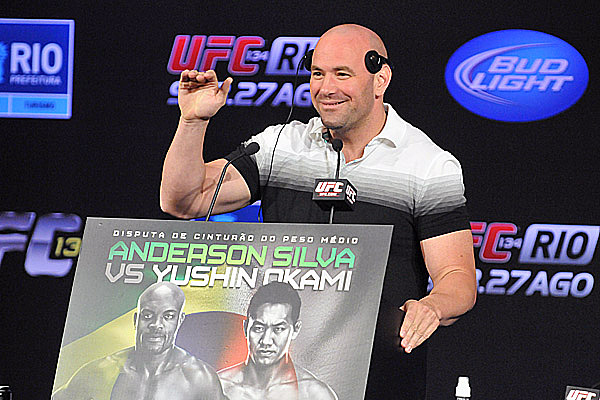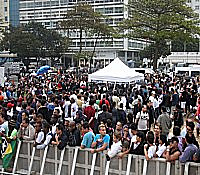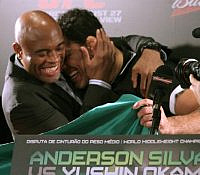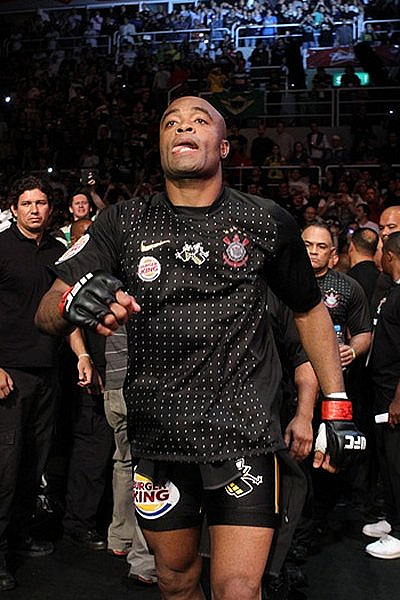Sherdog’s 2011 Event of the Year: UFC 134

UFC
134 in Rio set the bar even higher than the UFC could've imagined
in Brazil. | Photo: Sherdog.com
The year past was filled with plenty of thrilling cards, as well as major events. However, those two distinct qualities were found together in no greater instance than the UFC’s long-awaited awaited return to Brazil with UFC 134 in August.
Despite being the cradle of modern MMA, Brazil hadn’t hosted a UFC event in nearly 13 years. Quite simply, it didn’t make much sense prior. For years, the UFC’s profile in Brazil was dwarfed by that of Japan’s Pride Fighting Championships, where most Brazilian greats of the day fought. Since the fall of Pride, however, the world’s fifth-largest country had become a hot, emerging economy. A developing middle class and a growing enthusiasm about the UFC product made Brazil a no-brainer destination in 2011.
Advertisement
When tickets went on sale for the Aug. 27 bill in Rio de Janeiro, the 14,000-plus tickets at HSBC Arena lasted all of 74 minutes. Fans from all over Brazil were up in arms as Brazilian online ticket retailer Ingresso simply could not meet their demands. In all, some 350,000 fans were in the running for those 14,000 tickets, prompting two subsequent additional ticket sales.
In subsequent UFC 134 ticket releases, 1,000 more lasted 12
minutes, and the final 272 passes -- especially reserved for
Brazilian residents -- lasted 18 minutes.
“It sold out fast. It’s one of those situations where we were a little gun shy down there. We have a 14,000-seat arena down there, and 350,000 people were online looking for tickets. We probably could have done a bigger arena, but we played it safe for the first time down there. It’s a big deal,” UFC President Dana White said following a shockingly quick sellout.

Sherdog.com
Fans flooded Copacabana Beach
for 134's open workouts.
For the most part, 134’s undercard was unspectacular, save for Brazilian prospect Erick Silva’s 40-second demolition of Luis Ramos, yet even the most pedestrian Brazilian-versus-Brazilian bouts were met with passion and energy. Inside the HSBC Arena, flags from almost every Brazilian state were present, and voices from every corner were heard. When special forces officer-stroke-welterweight Paulo Thiago emerged, the chants of “Caveira!” (skull) and “Oh! Vai morrer!” (“Oh, you’re gonna die!”) transformed the atmosphere into the most World
Cup-esque the UFC has ever seen.
In the evening’s two headlining bouts, revenge was the theme. Middleweight king Anderson Silva defended his throne by dominating Yushin Okami, stopping him in the second round to avenge his controversial January 2006 disqualification defeat. Meanwhile, Mauricio Rua avenged his September 2007 loss to fellow former UFC light heavyweight champion by Forrest Griffin, punching out the “TUF” winner in less than two minutes.
UFC 134’s real hero, however, was even more fitting.
Incredibly, the UFC’s Brazilian return marked the first time in the long and legendary career of Antonio Rodrigo Nogueira that he got the opportunity to fight before his home crowd. Unlike many of his era, Nogueira jumped from jiu-jitsu to international MMA with no domestic vale tudo in between. In spite of a 12-year career and being an all-time MMA icon, “Minotauro” never had the chance to compete in front of the country to which he had been a fighting idol for nearly a decade.
A two-to-one underdog against rising prospect Brendan Schaub, Nogueira was coming off 16 months of inactivity following his February 2010 beatdown at the hands of Cain Velasquez in Australia. Furthermore, he was coming off of double-hip surgery and an ACL repair, which he underwent quickly in order to get the opportunity to fight in Brazil.
“For sure, I rushed my rehab because the fight was in Brazil. I did six, seven hours of physical therapy a day,” Nogueira told MMAFighting.com. “Normally I’d be right to fight in October, but the fight was in Brazil, the first fight in Brazil, and it represents a lot to me.”

Sherdog.com
It was a great night for
Brazilian idols at UFC 134.
In the end, UFC 134 had everything: dominant performances by stars, an emotional upset, a contentious lightweight bout, some new prospects, and big entertainment. For the partisan crowd, Brazilian fighters went 7-1 against foreign opposition, the lone slip-up coming in the form of Luiz Cane’s inability to fight southpaws -- in this case, Bulgaria’s Stanislav Nedkov.
However, UFC 134 stands apart in 2011’s landscape because it has a unique, rippling resonance. UFC 134 was the event that finally turned Anderson Silva into a star in his native Brazil, crystallizing deals with Nike, Burger King and soccer team Corinthians. These deals, especially the Corinthians endorsement, would pave the way for bigger sponsorships in Brazilian MMA’s immediate future, especially soccer teams sponsoring their fans who happened to be fighters, such as Flamengo with Jose Aldo and Cruzeiro with Paulo Thiago.

Sherdog.com
UFC 134 in Rio helped make
Anderson Silva a Brazilian star.
More importantly, the overwhelming success and positive media attention from UFC 134 transformed the image of the sport in Brazil forever by garnering the affections of Rede Globo.
The fourth-largest public TV commercial network in the world, Rede Globo is not just the most influential broadcaster in Brazil, but resultantly, an important piece of Brazilian mass culture.
For years, dating back to the vale tudo-style wars, Rede Globo had been against vale tudo, MMA or similar iterations of prizefighting on TV. However, the unmitigated success of UFC 134 led Rede Globo to ink a deal with Zuffa which began with November’s Junior dos Santos-Cain Velasquez clash. An estimated 22 million Brazilians watched dos Santos’ title win live, and it’s estimated that number has doubled since. This deal is also what made the forthcoming “Ultimate Fighter: Brazil” possible, a product which might prove just as influential in Brazil as it was seven years ago stateside.
MMA has always been filled with elite Brazilians. However, there is now an international climate in MMA -- or at least the UFC -- that can financially capitalize upon this point.
For years, Brazilian MMA fans had to watch their greatest fighters compete a world away in Japan. Now, UFC brass is looking at multiple cards in Brazil every year. Eventually, they’ll hit the muggy, swampy north that gave us Jose Aldo and Lyoto Machida, and they’ll see how vibrant the fight scenes of Manaus and Belem are. In time, even Sao Paulo – Brazil’s financial and metropolitan capital which doesn’t share a historical connection with MMA like Rio -- will become a viable, maybe even lucrative destination.
It is this outcome which is so fundamentally important. The success of the UFC in Rio and the subsequent TV deal with Rede Globo have quickly reinvented how the UFC is looking to do business internationally. Let UFC CEO Lorenzo Fertitta tell you about it.
“You know, part of the issue is that we’ve struggled, not with the popularity in the U.K. ... we do very well with selling tickets there, but we’ve had a hard time getting a television deal that makes sense for us,” Fertitta told AOL.com in August, comparing and contrasting the British and Brazilian markets. “So, we’ve got to move our business around where it makes the most sense.”
Traditionally, being an MMA “star” has meant you can sell over half a million pay-per-view buys on your own. For Portuguese-speaking Brazilians, this has been a daunting task. Now, the UFC’s new look at international TV has unearthed new possibilities, where a Junior dos Santos or a Jose Aldo could ultimately draw tens of millions of eyeballs in Brazil, even if North American PPV’s aren’t their forte.
Last year had action on all corners of the globe, but none of them had an impact, let alone the aftershocks, of UFC 134, 2011’s evento maravilhoso.
Related Articles






